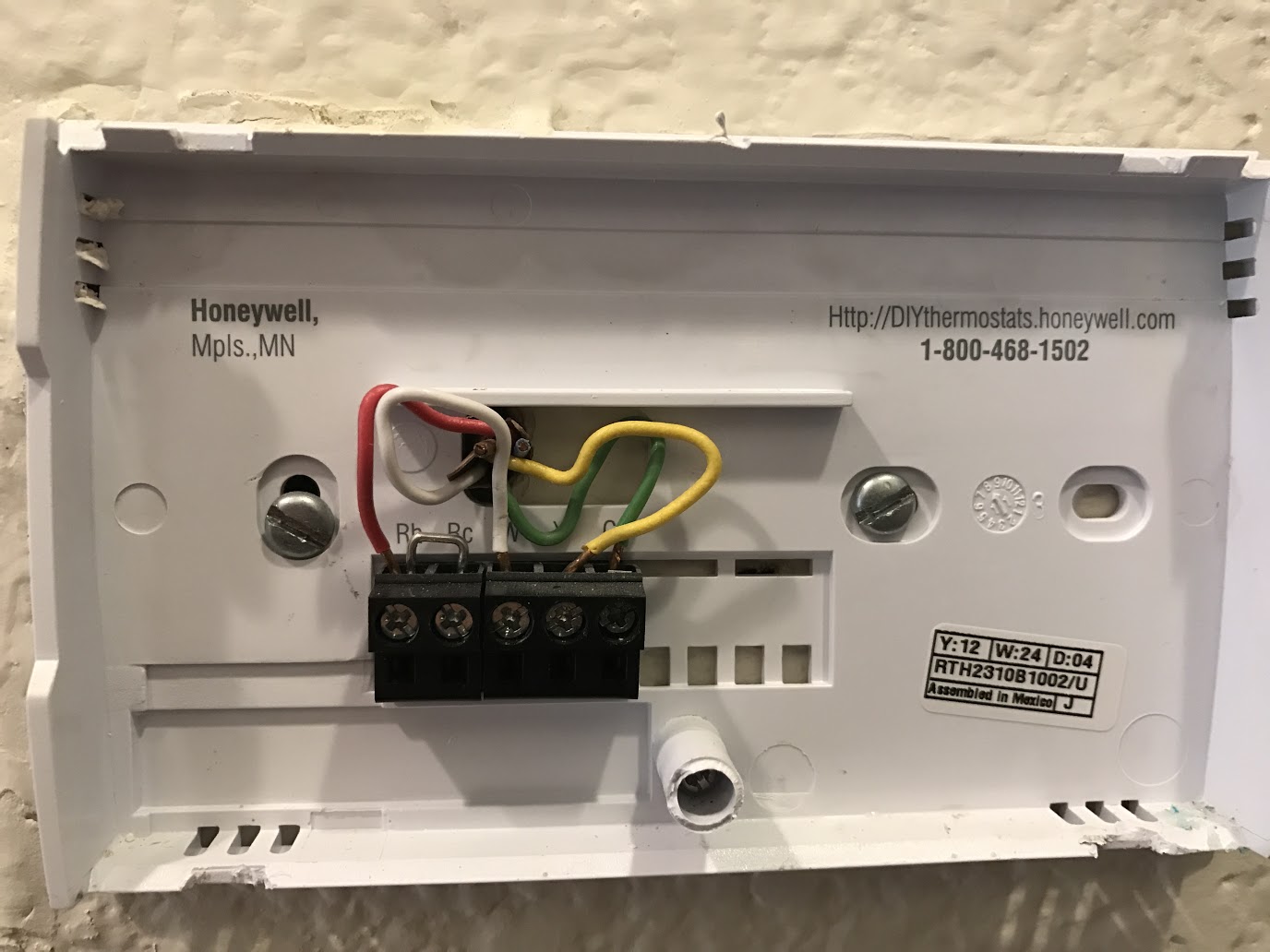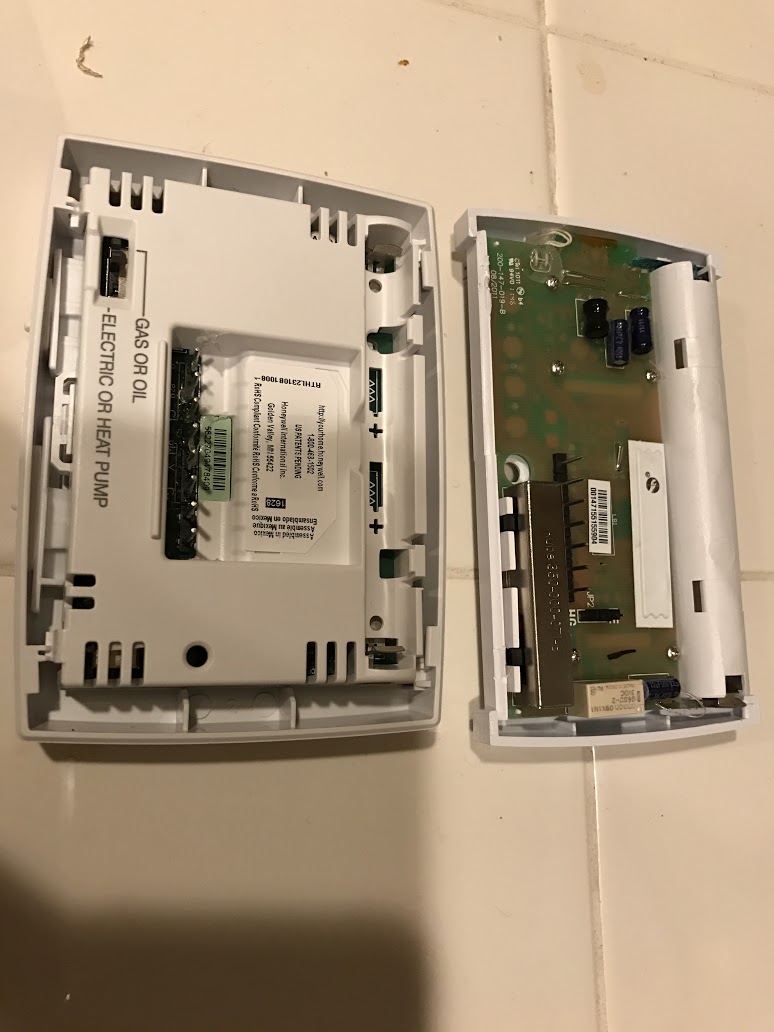I have a year 2000 house in Bay Area California. The Honeywell RTH2520 thermostat that came with the house doesn't work anymore because the metal things on the side of the AA batteries became aqua colored and corroded. So I'm replacing it with a Honeywell RTHL2310B. This new thermostat asks me to flip a switch to gas or electric. I looked at the back of the old one and it doesn't have a switch at all. I don't know which type of heating/cooling I have in my house. How to I figure out?
-
3Can you post pictures of the actual furnace?– ThreePhaseEelCommented Dec 4, 2016 at 1:24
-
1You could just clean the old thermostat's battery contacts with a fine abrasive, you know... I'd look at the boiler/furnace, personally, but you could look up the user manual for the old thermostat and see which jumper sets gas/oil/electric and what position it is set to.– keshlamCommented Dec 4, 2016 at 1:26
-
6What bill goes up in the winter when you run heat? Gas or electric?– TysonCommented Dec 4, 2016 at 1:49
-
@Tyson here are screenshots of my yearly gas and electrical bill: imgur.com/a/sOFZv . The strange thing is both gas and electric goes up in the winter time. I only turn on the heater in the winter. I never use the A/C in summer.– JoJoCommented Dec 4, 2016 at 3:40
-
Just deleted my last comment. I'm going to let someone else direct you that has more specific Heating/Cooling knowledge. Specifically I found conflicting information, on a different web page.– TysonCommented Dec 4, 2016 at 3:58
3 Answers
Actually, the old thermostat DOES have a "gas/electric heat" jumper. It's labeled "JP2" and the "HG" setting is for gas. The "HE" setting is for electric. It appears to be the exact same thing, just poorly labeled.
Look closely (don't touch) and its setting should be apparent.
A Google search revealed the manual in PDF as the #1 result and section 2.4 discusses the JP2 jumper.
P.S. Another way to find out if you have electric heat is go to your electric service panel and look at the labels on the breakers. For electric heat, it would be one of the large (double-wide) breakers. Turn the breaker off and see if your heat still works. The thermostat should continue to work, because it is fed from a 120V circuit (which uses a single-wide breaker).
If the breakers are not labeled, you know electric heat must be a double-breaker. You can find it by trial and error. Generally it won't do any harm to turn a double-breaker off. They control a single device: air conditioner, water heater, and the like. That device will stop working and that is all. I would label what you can.
(now in older homes or ones with well-wired outbuildings, sometimes a double breaker actually feeds a sub-panel, which has many other things running off it. I don't see that as likely in a new-build California home.)
Have you ever ventured into the basement? Do you have access to it, or someone else owns that part? If not, and you bought the house, the heating description will be in your purchase disclosure. You could ask your realtor for it if you can't find it and it was a recent purchase. If you can access the basement, you'll have some options. If there is NO furnace (nothing with big vents or lots of pipes coming out of a single 'box'), and you have many baseboard heaters, with perhaps a box that sites outside your house that looks like an air conditioner that has hoses that go into the house? Then Electric. If you have a furnace, does a little thin bendable tube come to the furnace from the outside (or inside) tank? That would be an oil furnace. Or, do heavy thick and sturdy pipes with shut-off valves go to the furnace from a meter outside? Then that's gas!
-
I don't have most of the things you talked about. I have a giant box outside of the house that is labeled as an air conditioner. I also have a giant cylindrical tank in some closet-like compartment on the outside of my home which appears to change the water temperature. Is this cylinder the same thing that does air heating as well as water heating?– JoJoCommented Dec 4, 2016 at 3:36
-
@JoJo Do you have a big box somewhere inside your house that has pipes connecting it to the box outside your house? Commented Dec 4, 2016 at 5:06
-
Just FYI. In California, there are basically zero oil furnaces. I'm 99% sure the OP has either gas or electric heat. Commented Dec 4, 2016 at 18:12
-
From her comment, I'd choose electric heat. What she describes sounds like a heat pump. Why the negative hit? If anyone downgrades, then explain why so it improves the community knowledge base. Otherwise you come off as a spammer Commented Dec 7, 2016 at 23:06
Your question: "How do I figure out what type of heating is in my home"
Answer: There are two types of heating solutions: radiant heating and forces air heating. From my understanding radiant heating does not use the type of thermostat you have. So you have a forces air heating system. This means there is a furnace somewhere in your home. This should be installed on the lowest floor in your home. Locate the furnace and examine it. While it's running, if you seem flames or light coming from it, it's a gas furnace. If not, then look at the pipes/lines connected to it. Posting a picture would be best. If you cannot, then if there is an iron or flexible pipe connected to your furnace, this is a gas line and therefore a gas furnace. Otherwise it's probably electric. But since you said your gas bill spikes in the winter, you have a gas furnace unless you have a gas fireplace that you run during the winter.
-
radiant heat uses any type of thermostat - it depends totally on the heat source. You would get a -ve from me on that as it's misleading Commented Dec 7, 2016 at 23:03


